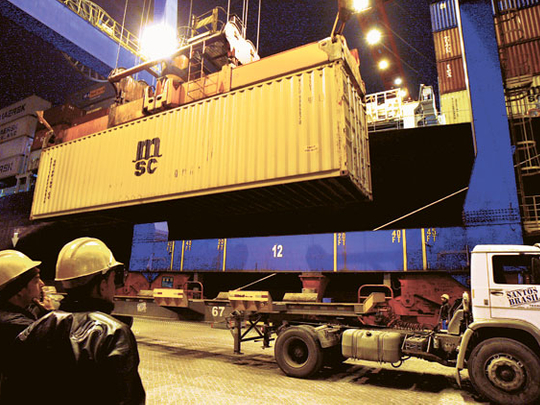
Dubai: Brazil is eager to finalise a free trade agreement between the GCC and the Mercosur bloc but believes the petrochemicals sector will be exempted until further study after the signing, said Brazilian Trade and Industry Minister Fernando Pimentel.
"They can capitalise on the opportunities that will come after signing the agreement. I think the signing will happen but petrochemicals may be exempted for study afterwards," Pimentel told reporters during an official visit to Dubai leading a Brazilian trade mission.
"Brazil's intention is to sign [the agreement] as quickly as possible but it cannot speak on behalf of the whole Mercosur because the matter must pass the parliament of those four countries before it can be signed. So we cannot specify a date," he said.
The Brazilian government is spending $403.5 billion (Dh1.4 trillion) on infrastructure projects from 2010 to 2014 to boost facilities in key sectors, including airports and ports, according to The Brazilian Association of Infrastructure and Basic Industry (Abdib).
Brazilian businessmen in sectors ranging from meat processing to furniture have complained about the red tape, bureaucracy and slow procedures to clear customs, they told Gulf News.
Asked how the government expects to attract foreign investors given these hurdles, Pimentel said: "Brazil today is in a transformative phase. Five or six years ago we exported $60 billion to $70 billion [worth of products], now we are exporting $250 billion and imports have increased similarly. This means that international trade has expanded and developed very quickly but domestic institutions and infrastructure have not kept up at the same rate. Now the government is investing in airports, ports and international trade administration."
High Arab investment
Brazil received $60 billion in foreign investment last year, of which 10 to 15 per cent was Arab investment inflows, he said and added Brazil's relationship with Iran has not been affected by the sanctions.
"There is no setback in the relationship between Iran and Brazil. Brazil did not support or participate in the Western-imposed sanctions on Iran. On the contrary, Brazil will exert efforts to strengthen economic and political relationships."
Pimentel stressed the importance of Brazil-UAE economic relations as the only way to face the European debt crisis without it "coming to our doors".
Four memorandums of understanding were signed during the first day of the Brazilian trade mission.
The first was an agreement between the Brazilian Trade and Investment Agency (Apex-Brazil) and Jebel Ali Free Zone Authority to enhance the presence of Brazilian companies by establishing their offices and production houses in the free zone.
The second was between Apex-Brazil and Dubai Media City to create incubators for Brazilian companies in the service sector so they can have offices in Dubai at lower costs.
The third was between Apex-Brazil and the Dubai Export Development Corporation for the exchange of information and improving collaboration.
The final one between Apex-Brazil and Dubai Foreign Direct Investment is for a partnership for event promotions.










